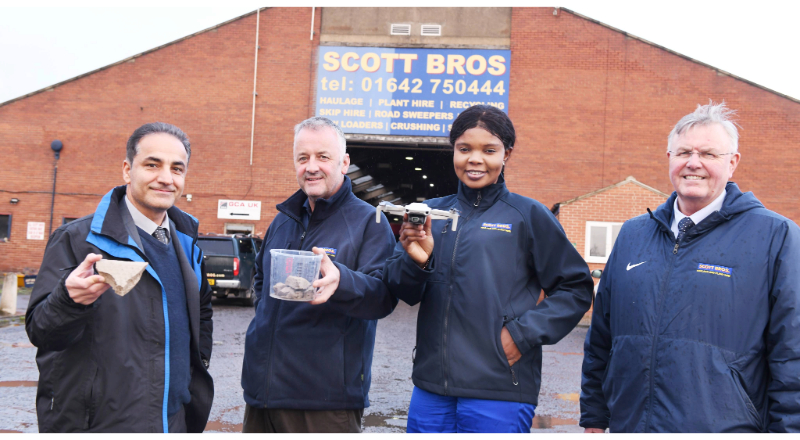Supporting the development of a new carbon credit market
A collaboration between Teesside University and a leading waste recycling company is helping to create a £200m carbon credit market by using soil to capture carbon from the atmosphere.

The University has an ongoing relationship with Stockton-based Scott Bros and has worked on several projects looking at to how to utilise waste materials to support a net zero economy.
In this latest project the two organisations will look at how best to use remote technology to monitor how effectively carbon is being sequestered by an ‘artificial soil’ created through previous research and collaboration activities.
By establishing an effective method of measuring the carbon capture abilities of the soil the research will enable Scott Bros to enter into the carbon credit marketplace and derive income from carbon sequestration schemes.
Through the development of a new digital remediation function the business can create an external service giving access to land and the digital remediation facilities to other landowners wishing to measure the carbon performance of their waste.
To support the research Scott Bros and the Teesside University have entered into a Knowledge Transfer Partnership (KTP), a three-way collaboration, part-funded by Innovate UK, between a business, an academic partner and a recent graduate to deliver a strategic innovation project to drive business and growth and innovation.
Eghe Ikponmwosa-Eweka has been employed as a KTP Associate to support the project.
The KTP will investigate how artificial intelligence and internet of things (AIoT) technology can be used to evaluate Soil Carbon Content (SCC) thereby improving Monitoring, Reporting and Verification (MRV) of carbon capture.
Existing MRV methods are not credible to drive effective carbon credits as they struggle to precisely evaluate SCC for many reasons, including data quality and manual and error-prone monitoring infrastructure.
Therefore, an intelligent MRV framework utilising AIoT expertise is needed to precisely measure and understand the sources of emissions and trends to design appropriate mitigation strategies, assess the efficacy of such strategies, and support their market credibility and public perception.
This KTP will create the opportunity to generate around £200 million annually in carbon credits by turning waste into value through technologies that remove carbon dioxide.
Dr Sina Rezaei Gomari, Associate Professor of Research at Teesside University, who is leading the KTP, said: 'This project will develop in-situ sensors and remote sensing platform to monitor Soil Carbon Content and provide a machine learning model to predict the carbonation under different soil conditions for years to come.
'This can be used by farmers, material waste managers, and government to evaluate their contribution to carbon budget and credits.'
Bob Borthwick, a Director of Scott Bros, said: 'Our strategic ambition is to recycle 100 per cent of our construction waste and to identify alternative intelligent recycling solutions and markets to enable this.
'Therefore, we are proud that Scott Bros has committed to the delivery of this new business area by investing heavily in land within the Tees Valley to utilise for digital monitoring of the carbon performance of waste streams.'
Fellow Director Peter Scott added: 'A digital solution will help us expand our reach, allowing us to offer our new MRV services across the country, and eventually to landowners and haulage companies internationally.
'This KTP will create the opportunity to generate around £200 million annually in carbon credits by turning waste into value through technologies that remove carbon dioxide.
'Building a reliable MRV system is crucial for carbon markets to succeed, helping landowners earn money for capturing and storing greenhouse gases in the soil.'
Professor David Hughes, Associate Dean (Research and Innovation) in the School of Computing, Engineering & Digital Technologies, said: 'This project aligns perfectly with our £40 million investment in our forthcoming Digital Life Building which will house of state-of-the-art AI and robotics suites, and will complement our Net Zero Industrial Innovation Centre ( NZIIC) supporting companies to achieve their net zero ambition.'